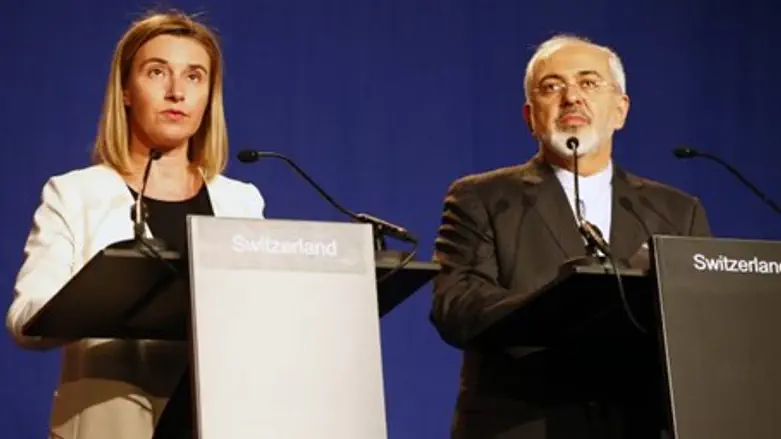
After intense negotiations between world powers and Iran over the Islamic regime's nuclear program required an extension of the March 31 deadline for a deal outline, representatives of the talks held a press conference Thursday night, in which they announced that a framework agreement had, after all, been reached.
The press conference concluding the talks was held in Lausanne, Switzerland, at about 8:40 p.m. Israel time.
According to the EU representative, Federica Mogherini, who spoke first at the news conference, the Fordo nuclear plant will continue to operate but there will be no fissile material inside it, according to the agreement. The heavy water reactor at Arak will be redesigned so that it will not produce material for weapons grade plutonium and instead serve for research. There will be no uranium enrichment in any site other than Natanz.
Iran has apparently agreed to cut its uranium enrichment capabilities by two thirds, to about 6,000 centrifuges, but exact numbers of centrifuges were not given.
US President delivered a statement Thursday evening as well. “It is a good deal,” he said, “a deal that meets our core objectives. This deal would cut off every pathway that Iran could take” to build nuclear weapons.
He said the accord calls for “the most robust and intrusive inspections” ever negotiated for any nuclear deal in history. Obama added that “if Iran cheats, the world will know it.”
He said that he would call Israeli Prime Minister Binyamin Netanyahu to inform him of the details of the deal, and said that there would be “inevitable” criticism of the deal, but asked if anyone thinks that the deal is “a worse option than the risk of another war in the Middle East.”
According to Iran's Foreign Minister Mohammad Javad Zarif, US and EU sanctions on Iran will be removed immediately, on June 30.
However, Mogherini's version of the accord is that sanctions will be removed gradually over ten years.
The Iranians are reportedly pleased with the deal worked out in the talks about its nuclear abilities.
US President Barack H. Obama is reportedly planning to give a statement following the news conference at Lausanne.
White House press secretary Josh Earnest revealed this week that if progress is not made, the US will not be obliged to wait for the final June 30 deadline for an agreement, and instead will be prepared to walk away from the talks.
In a final spurt that did not succeed in concluding with a deal, the talks were extended two days beyond the deadline on Tuesday.
French Foreign Minister Laurent Fabius spoke about the progress of the talks on Wednesday, upon his return to Lausanne after having briefly gone home to France.
"The process still hasn't ended," said Fabius. "There are still unresolved topics on the docket, which require flexibility - primarily from the Iranian side."
Israel has noted that there are 17 states which have peaceful nuclear programs, and none of them enrich uranium as Iran is demanding it be allowed to continue doing.
Prime Minister Binyamin Netanyahu warned on Tuesday that the deal being formulated will leave Iran with its secret nuclear facilities and centrifuges used in enriching uranium.
In addition to openly calling for the destruction of Israel, Iran has continued to exhibit its overt hostility towards America as well.
After US Defense Secretary Ashton Carter warned Tuesday that the military option is still on the table if talks fail, Iranian Defense Minister Hussein Dehqan said his nation is ready to confront America on the battlefield, in a direct challenge to the US.
Meanwhile on Thursday, Prime Minister Binyamin Netanyahu tweeted that “Any deal must significantly roll back Iran’s nuclear capabilities and stop its terrorism and aggression. #IranTalks.”
The PM's tweet was accompanied by the following graphic: